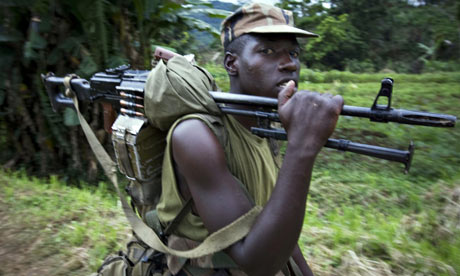Kigali denounces claims, including possible genocide, as 'insane' and threatens to withdraw from peacekeeping missions

Rwanda threatened to withdraw its forces from UN peacekeeping missions – including leading the operation in Darfur – over the report which says that its army and allied militias were responsible for the slaughter of tens of thousands of Hutus, including women and children, in retaliation for the genocide of Tutsis in Rwanda in 1994.
The report, by the office of the UN high commissioner for human rights (OHCHR), accuses the Rwandan army of the "relentless pursuit and mass killing" of Hutus after invading what was then Zaire in 1996 in pursuit of the forces responsible for the genocide two years earlier. It details hundreds of mass killings which it says are undoubtedly war crimes and "could be classified as crimes of genocide".
The document was leaked last month, possibly in response to the pressure from Rwanda to suppress it. It had been scheduled for release in early September but the UN said it is being delayed until next month to allow the addition of comments from countries named in it. These include not only Rwanda but its neighbours, Uganda and Burundi, as well countries later drawn in to the conflict in Congo such as Angola.
The report has been welcomed by international human rights groups, which have said it should form the basis for a legal investigation of war crimes by the Rwandan army and its allies in Congo. Rwanda's foreign minister, Louise Mushikiwabo, has called the report "incredibly irresponsible".
Kigali is outraged at the charge of genocide against a leadership that brought an end to the genocide of Tutsis by an extremist Hutu regime in 1994. Rwanda sees the accusation as politically motivated and as part of a widening campaign to discredit it and diminish the mass murder of the Tutsis, in part led by lawyers for Hutu extremist leaders on trial at an international tribunal.
Mushikiwabo wrote to the UN secretary general, Ban Ki-moon, last month accusing investigators of using "the lowest evidentiary standard" to back the allegations of war crimes and genocide. "Attempts to take action on this report – either through its release or leaks to the media – will force us to withdraw from Rwanda's various commitments to the United Nations, especially in the area of peacekeeping," she said.
The OHCHR said it will delay release of the report to allow comments but it is unclear whether substantial amendments will be made. If the accusation of possible genocide is removed it will appear that the UN has bowed to Rwandan pressure. Diplomats said that it is possible that the charge could remain but the scope and legal reasoning behind it could be refined.

No comments:
Post a Comment